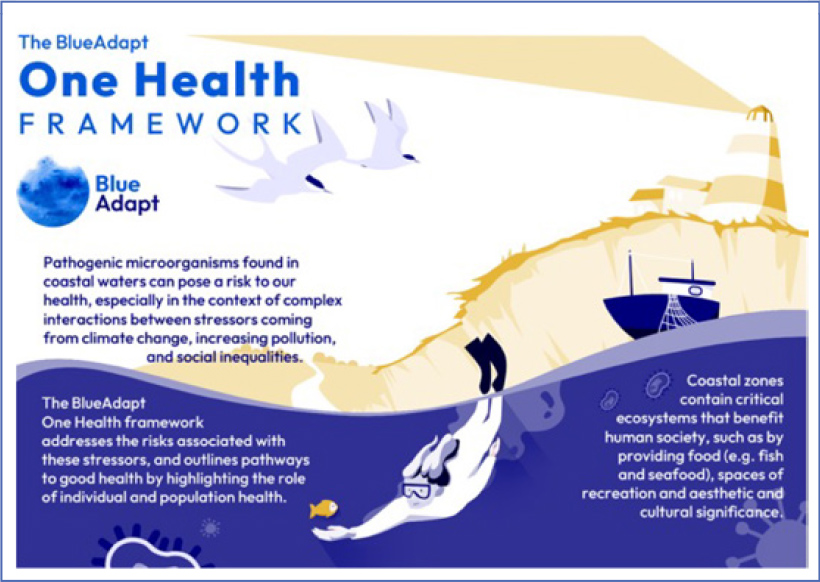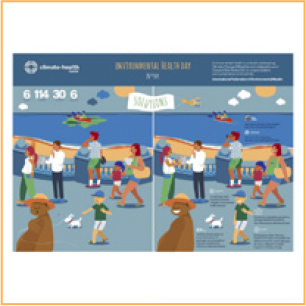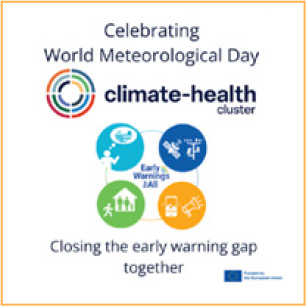|
|
|
|
|
Welcome message
|
Dear colleagues,
We are pleased to share with you the latest updates from the European Climate-Health Cluster. Over the past months, our projects have worked together to advance the science on climate and health, strengthen collaboration with policymakers, and translate research into meaningful action.
This newsletter highlights joint achievements across the Cluster, including our policy dialogues in Brussels, workshops with stakeholders, and the latest scientific outputs from our projects. By bringing together diverse expertise, we aim to deepen understanding of the health impacts of climate change and to support evidence-based solutions that are both scalable and locally relevant.
We invite you to explore the resources, events, and project highlights featured below. Together, we can ensure that climate action and health remain at the forefront of research, policy, and practice.
With kind regards,
|
 |
Debra Jackson & Emilie Peeters
Cluster Coordinator & Cluster Manager
(HIGH Horizons) |
|
 |
Marc Neumann & Kevin Portune
Project Coordinator & Project Manager
(BlueAdapt) |
|
|
|
|
|
Cluster updates
|
|
On 5 December 2024, the Climate-Health Cluster
brought researchers and policymakers together to turn
science into action. As MEP Leire Pajín Iraola said, “It’s not
so much about how politicians can listen to researchers;
it’s more about how we can work together… to create
public policies together.” The workshop highlighted new
ways to bridge research and policy.
|
|
|
|
|
|
The Climate-Health Cluster met in Brussels (2–3 June),
teaming up with the Planetary Health Cluster to turn
science into action. Together, they explored how to tackle
health inequalities, climate impacts, and boost policy
impact through collaboration.
|
|
|
|
|
|
On 3 June 2025, the Climate-Health Cluster hosted a
roundtable at the European Parliament bringing
policymakers and researchers together in Brussels to
explore how EU climate action can better protect human
health and spark new ideas for collaboration.
|
|
|
|
|
|
Climate-Health Cluster members contributed to a key
session at the European Health Forum Gastein,
highlighting how climate change disproportionately
a ects vulnerable populations and the importance of
equity-centred responses. Learn how research,
innovation, and cross-sector collaboration can protect
health and build resilience across Europe.
|
|
|
|
|
Members from the projects within the European
Climate-Health Cluster participated in the ENBEL 2025
Conference held on 16–18 October 2025 in Tallinn,
Estonia. The second edition of this transdisciplinary
conference provided a platform to share research findings
and engage in discussions on the impacts of climate
change on health, adaptation strategies, societal
implications, and opportunities for climate-resilient
development.
Cluster project representatives presented their work on
key topics such as health inequalities, unequal exposure,
vulnerability, and adaptive capacity reflecting the
collaborative research e orts within the European
Climate-Health Cluster.
|
|
|
|
|
|
|
|
See our social media
and web campaigns
|
|
|
|
|
|
|
|
|
|
Resources
|
|
We have created some resources that you can use to learn more about CLUSTER.
|
|
|
|
CHC Presentation Video
|
 |
|
|
|
Cluster Project Updates
|
|
The cluster projects join forces to maximize the impact of EU-funded research on climate, health, and policy. By sharing findings, organizing joint activities, and engaging with stakeholders, we turn research into action—showcasing TRIGGER’s new deliverables and policy briefs, BlueAdapt’s One Health Framework, CATALYSE’s climate–health studies, CLIMOS's webinars and sand fly fieldwork, and HIGH Horizons’ heat adaptation solutions.
|
 |
|
On 5 December 2024, the Climate-Health Cluster
brought researchers and policymakers together to turn
science into action. As MEP Leire Pajín Iraola said, “It’s not
so much about how politicians can listen to researchers;
it’s more about how we can work together… to create
public policies together.” The workshop highlighted new
ways to bridge research and policy.
|
|
Find out more.
|
 |
|
The BlueAdapt project presents a new policy brief, one of three
interlinked products on the BlueAdapt One Health Framework,
o ering practical guidance to protect human health from climate
change and pollution in Europe’s coastal environments. It outlines
the evidence, highlights the urgency, and provides four key policy
recommendations with actionable steps for policymakers.
|
|
Find out more about our OneHealth products here.
|
|
|
|
|
 |
|
CATALYSE researchers have published a new framework linking
climate change mitigation with health. It fills key gaps by ensuring
that the health co-benefits and potential harms of mitigation are
considered, and by detailing interventions and pathways specific to
health care. The approach highlights how environmental
sustainability and public health are deeply interconnected, urging
policymakers to address both together for better outcomes.
|
|
Read more here.
|
 |
|
A new CATALYSE study across 32 European countries shows wildfire
smoke is deadlier than regular air pollution, sharply raising the risk of
respiratory, cardiovascular, and overall deaths. Current models
seriously underestimate its impact, highlighting the urgent need for
wildfire-specific health strategies.
|
|
More on the study here.
|
|
|
|
|
 |
 |
|
CLIMOS webinars are dynamic sessions designed to share
knowledge and raise awareness on Sand Fly-Borne Diseases
(SFBDs). They bring together leading experts to discuss sand fly
biology, the discovery of new viruses, and the latest advances in
diagnosing and treating leishmaniasis in humans and canines.
Through these virtual events, we share cutting-edge research,
foster discussion, and empower researchers, healthcare
professionals, veterinarians, and the public. By making knowledge
accessible, CLIMOS is building a stronger community ready to
respond to the health impacts of climate change.
|
|
Explore more about their training material.
|
 |
CLIMOS partners are currently busy collecting sand flies using CDC
traps across Europe. These specimens are being studied using a
standardised methodology to build a first-of-its-kind
comprehensive database. This data will be crucial for developing our
Early Warning System (EWS).çÇ
More than 35,000 specimens were processed from the first season
catches, of which around 93% were identified to the species or
subgenus level. A total of 19 sand fly taxa, belonging to seven
subgenera, have been identified so far. The majority of the
specimens were members of the Larroussius subgenus, with Ph.
perniciosus, Ph. perfiliewi, and Ph. tobbi making up the bulk of the
catches.
If you want to know more about the field work in each country and
see photos, take a look at: https://climos-project.eu/trapping-sites/
|
|
|
|
|
 |
 |
|
Beating the heat starts with the building – without interventions
that reduce the impact of outdoor climate on indoor conditions in
health facilities, thermal stress can put sta and patient care at risk.
The rising demand for cooling mirrors the projected increase in
global energy use. Passive refurbishment measures o er an
e ective way to prevent overheating, cut energy consumption, and
reduce future carbon emissions.
|
|
Read more here.
|
 |
|
Local stakeholder engagement is crucial – resources to adapt
and build heat resilience vary widely across countries and
communities. Adaptation models must be both locally relevant and
scalable. Together with local stakeholders, HIGH Horizons
co-created tailored heat adaptation solutions for maternal,
newborn, and child health services. These include infrastructure
upgrades, nature-based measures such as planting trees around
health facilities, and changes in health worker practices. To o set
emissions, stakeholders also selected mitigation actions using our
CARBOMICA tool.
|
Read more here on newly planted trees.
Read more on the CARBOMICA tool.
|
|
|
|
|
 |
 |
|
Climate change is intensifying pandemic risks by accelerating
cross-species virus transmission — yet most research still overlooks
major spillover threats beyond malaria and dengue. In The Lancet
Planetary Health, IDAlert calls for breaking silos between climate and
health, showcasing how its early warning tools and cross-sector
collaboration can build real resilience against future pandemics.
|
|
Read more here.
|
 |
EpiOutlook platform for climate-sensitive infectious diseases
taking shape.
The EpiOutlook platform, developed within the IDAlert project,
o ers a cutting-edge early warning system for climate-sensitive
infectious diseases. It integrates seasonal climate forecasts with
epidemiological risk indicators to predict the changing climatic
suitability for diseases such as malaria, dengue, West Nile virus, and
tick-borne illnesses, with lead times up to several months. Soon to
be hosted by the European Climate and Health Observatory, it aims
to give health systems a practical tool to stay ahead of
climate-driven health threats.
|
Explore more about the platform.
More about the multi-model framework.
|
|
|
|
|
 |
|
TRIGGER is advancing knowledge at the intersection of climate and
health with four new public deliverables online. They cover
everything from health-related hazard indicators and
high-resolution forecasting to seasonal heatwave predictions and
long-term projections of climate risks in Europe. Together, these
resources provide tools and evidence to support policy, research,
and healthcare decisions.
|
|
Read more here.
|
 |
|
TRIGGER has released a new series of policy briefs to support
evidence-based climate and health policymaking. They highlight key
gaps and provide actionable recommendations on cardiovascular
and respiratory risks, mental health, and the intersection of air
pollution and climate change. Designed to guide policymakers and
healthcare providers, these briefs make health a central part of
climate strategies.
|
|
All four are available online.
|
|
|
|
|
|
|
|
|
|
These projects are funded by EU’s Horizon Europe Research and Innovation initiative under Grant Agreement numbers 101057764 BlueAdapt, 101057131 CATALYSE, 101057690 CLIMOS, 101057843 HIGH Horizons, 101057554 IDAlert, 101057739 TRIGGER.
|
|
|
|
Privacy Policy | Cookie Policy
|
|

































